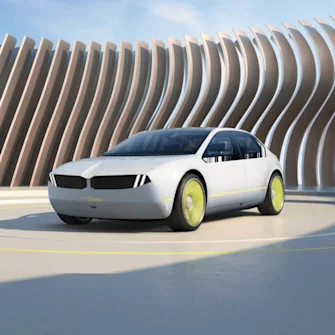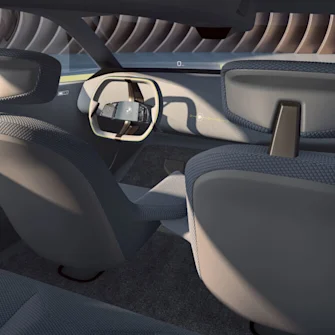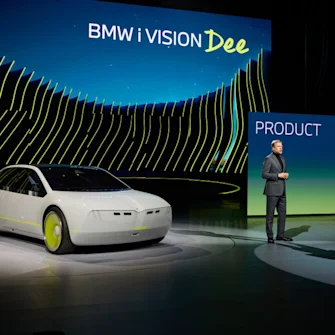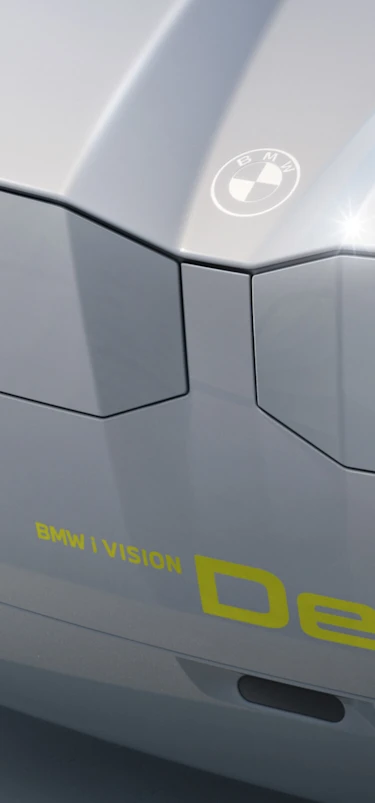BMW
Autos
January 19, 2023
BMW Envisions Cars With a ‘Digital Soul’
With a focus on personalization, the German automaker proved at CES that cars may soon push all our buttons.
Words by Jonathan Schultz
Photos courtesy BMW Group
The video seems innocuous enough. A four-door sedan bearing BMW’s familiar roundel badge on its snout cruises through Las Vegas. Digitally rendered flowers waft past the windshield. The Strip’s casinos bathe in animated fields of color. That’s when things really get weird. Arnold Schwarzenegger shows up in a motion-capture suit. A thumbnail photo of David Hasselhoff, circa Knight Rider, appears on the windshield.
These virtual visitors were all summoned following a request from the car’s voice assistant: “I’d really like to learn more about you.” Having been granted verbal permission to peruse its driver’s social media presence, the bimmer mines superficial yet algorithmically correct passion points — in this case, flowers, pop art, action stars from the ’80s — that make the driver’s journey feel more entertaining. More dialed in. More her.

BMW i Vision Dee. Photography by BMW Group
BMW i Vision Dee, which stands for Digital Emotional Experience, was billed by BMW at CES (formerly known as the Consumer Electronics Show) this month as a car “with a digital soul.” Hyperbole aside, the auto world’s window of incredulity may be closing, as Dee showed us at CES ’23.
For nearly a decade, the car industry has been narrowing the gap between a vehicle’s motive function and its emotional one. Whether it’s a virtual concierge that books your Zumba class or sensor-festooned bumpers that allow you to park remotely, today’s carmakers fall over themselves to surprise and delight.
This practice has accelerated in parallel with the rise of electric vehicles, and for good reason. EVs are rolling encomiums to the powers of circuitry, not combusted hydrocarbons. The millisecond calibration required to send electricity to wheel- or axle-mounted motors pairs well with ambitions to provide networked, personalized services to drivers.
There is, however, a tendency — especially at splashy trade shows — to treat concept cars as islands: fully formed ideas that rely solely on their mainframes to move about the world. That fiction hides the less glamorous but perhaps more consequential fact that to win, carmakers must tend the ecosystems surrounding their machines as fastidiously as they stitch vegan leather to seat cushions.

BMW i Vision Dee. Photography by BMW Group
Recently, business press has been churning out schadenfreude-tinged coverage of Tesla. There’s the company’s share price, which has fallen nearly 70% from its peak in November 2021. There’s its eroding position in China, the world’s largest passenger car market. There’s the federal investigation into its semiautonomous driving systems, stemming from a handful of crashes involving the technology. There’s its outspoken chief executive, who seems more invested in culture wars than mobility wars. And for the first time since Tesla hit its stride almost a decade ago, there’s viable competition from all corners of the market. Yet as noted in the inaugural issue of Huge Moves magazine, Tesla has built perhaps an unassailable lead in creating the ecosystem that supports its vehicles — and by extension, its drivers.
Beyond the gimmicky delights on board (videos of crackling fires, networked arcade games, farting turn indicators), Tesla owners can draw clean power at home from Tesla-branded photovoltaic roof panels. Urbanites can leave home confident that a Tesla Supercharger in working order will likely be found wherever they go. And when they engage Autopilot, the semiautonomous driver-assistance technology at the heart of the U.S. government’s inquiry, they will summon a sprawling body of proprietary knowledge that tells the car how best to get down the road.
Perhaps recognizing this, BMW chose to focus at CES on the personalization capabilities of its Dee concept. For all Tesla’s disruptive thinking around the ownership experience, even its future models — a semitruck, a pickup, a roadster — would never be confused with a driver’s companion. (It’s telling that when Tesla chooses to showcase its understanding of humanity, it introduces a humanoid.) Dee, however, wants nothing more than to be your road-trip buddy: a confidante that not only reflects and refracts your interests, but also strokes your ego.

BMW i Vision Dee. Photography by BMW Group
The car’s window glass might welcome its user back from an errand with an AI rendering of their face, a surefire way to flatter humans. Inside, a screenless dashboard meets the driver. By sharpening its voice-control tech and carefully moving display features to Dee’s windshield, BMW has come closer than any carmaker to crafting an environment that harmonizes down-the-road visibility with the delivery of digital services. "We [were] able to exploit the full potential of digitalization to transform the car into an intelligent companion", said Oliver Zipse, BMW’s board chairman, in a statement.
Of course, the feasibility of all this is unknown. CES lore is littered with test mules and capacitive screens that never left the convention center floor. BMW, however, says a version of Dee’s windshield-based display tech will be on the market as early as 2025, and with the advances in virtual assistants and other forms of AI, it’s not so far-fetched to think that Dee-caliber personalization features won’t be far behind.
That doesn’t mean BMW will have a winner. It would still need to build — never mind tend — the ecosystem that surrounds its product. But if the brand can summon the will to develop an ownership experience that feels as special as the car, the only response to, "I’d really like to learn more about you,” may be, “I thought you’d never ask."
Jonathan Schultz is a group creative director at Huge.
